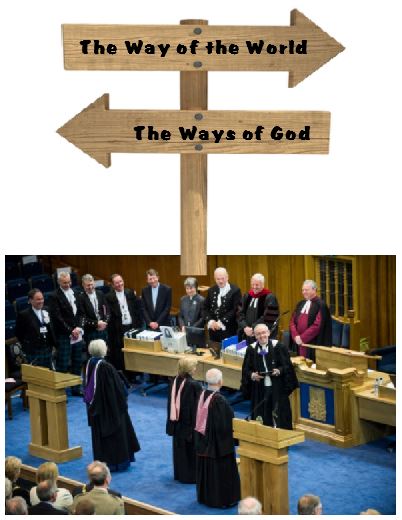Voting; when a bad thing can be a good thing
2015 may well be a ‘Make Your Mind Up’ time for Scotland’s national church. Please God.
 While a system of voting should have no place in a company of true Spirit-led believers, a poll can serve the purpose of separating the sheep from the goats; not least in a religious denomination which is an admixture of committed belief and outright rebellion. While a system of voting should have no place in a company of true Spirit-led believers, a poll can serve the purpose of separating the sheep from the goats; not least in a religious denomination which is an admixture of committed belief and outright rebellion.
The Church of Scotland operates a de facto hierarchy (the word actually means ‘rule by priests’) with ultimate authority on denominational matters residing within the General Assembly1 which convenes in the Spring of each year.
In May 2015, the Kirk will consider the responses from local churches (as represented and passed up by geographical presbyteries2) as to whether or not to affirm the view that ‘freedom of conscience’ should be extended to those clergy, congregations and members who are happy to recognise/conduct same-sex marriages; and to allow practising homosexuals (strictly speaking the word refers to both genders) to serve as ministers.
From the information that has thus far released it looks like the majority of presbyteries will support the so-called ‘mixed economy3’ proposal mooted at the close of the 2013 General Assembly whereby, in the ‘de jure’ sense, the Church will maintain its traditional position on monogamous heterosexual marriage while giving freedom to those churches, ministers and members to hold a different view. In effect the denomination would be saying: “This is the corporate position, but those of our number who choose to believe and practise something else are free to do so”. What an hypocrisy and display of double-standards.

While the votes from the presbyteries around Scotland are still coming in it would seem that the ‘acceptance’ majority of over 50% will be reached. Most recently Inverness Presbytery has voted against the proposal, and the convenor of the Presbytery’s doctrine and worship committee has said that the “apparently conciliatory” compromise arrangement which is currently being debated has in fact been divisive.
For those whose overarching ambition has been to keep the denomination united that may be a bad thing. However there is an alternative view.
The Almighty God whom the Church purports to worship abhors double-mindedness (Deut 30:19; Joshua 24:15; Psalm 119:113; James 4:8). And double-minded is what the Kirk has been for decades; certainly since 2009 when the General Assembly allowed a practising homosexual minister to remain in office.
So the vote has obliged individuals, local churches, presbyteries and ultimately the Church of Scotland’s General Assembly to come to a point of decision; and that is surely good. The ‘divisive’ procedure has at last forced the Church of Scotland to come to a point of decision following a spell of protracted indecision, prevarication and back-room manoeuvering which has so very badly damaged the cause of Christ in the nation. The procedure should put an end to the ungodly lengths to which many have resorted in order to preserve the denomination as a cohesive entity. “Unity” has been the cry while ‘Truth’ has been abandoned in the gutter.
Ultimately Jesus, the Lord of the church, will separate sheep from goats, and tares from wheat; but meanwhile, where heresy is obvious, the command of Scripture is clear. “Do not be yoked together with unbelievers. For what do righteousness and wickedness have in common? Or what fellowship can light have with darkness? What harmony is there between Christ and Belial? What does a believer have in common with an unbeliever? "Therefore come out from them and be separate, says the Lord. Touch no unclean thing, and I will receive you." (2 Cor. 6:14-15, 17)
We may well be witnessing the visible end of the denomination4 which the 16th-century Reformation created, but the cancer has long been at work. It has created the situation whereby Scotland has, by the standards of Almighty God, seen its national church brought to spiritual ruin.
We can only echo the cry of the prophet Habakkuk:
“Lord, I have heard of your fame; I stand in awe of your deeds, O Lord. Renew them in our day, in our time make them known; in wrath remember mercy.” (Hab. 3:2)
|
Everyone is inclined to sin: it is part of the human condition. Jesus, as we all should, showed great compassion to those doing wrong, but he said to the woman caught in adultery: "Go and sin no more." He didn't lower God's standards. |
Footnotes:
1. At the 2014 General Assembly the ‘Overture’ was developed and passed down to local churches. However ultimately it is those who ‘sit’ on Presbytery who deliver the local vote. At the General Assembly each presbytery has one vote irrespective of the number or size of local churches in the area. Complaints continue to be made that past Moderators have far too much say at General Assemblies; and, rather than having the right to attend every year, should be part of the rota system to which others are subject.
2. A presbytery is a geographic grouping of local churches. The court is made up of a minister and elder from each congregation along with retired ministers in the local area.
3. The ‘mixed economy’ proposal was put forward towards the end of the debate at the 2013 General Assembly. The 11th-hour intervention was made by Rev. Albert Bogle (judged to be an ‘evangelical’) who had just handed over his moderator role to his successor that year. As the incoming moderator Rev. Loran Hood said of the proposal: “This is a massive vote for the peace and unity of the Church”.
4. Since 2011 and there has been a modest but steady flow of ministers and members leaving the Church of Scotland. Some of the congregations which have left have been from the largest evangelical churches. Coupled with the marked decline in church membership and the loss of income from those who have left the Church is struggling financially and in terms of its standing and reputation: not least before God.
|